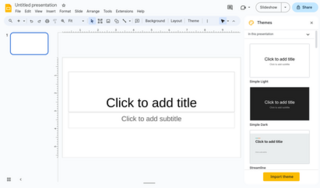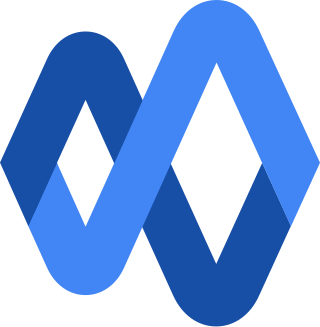Related Research Articles
Blogger is an American online content management system founded in 1999 which enables its users to write blogs with time-stamped entries. Pyra Labs developed it before being acquired by Google in 2003. Google hosts the blogs, which can be accessed through a subdomain of blogspot.com. Blogs can also be accessed from a user-owned custom domain by using DNS facilities to direct a domain to Google's servers. A user can have up to 100 blogs or websites per account.
A favicon, also known as a shortcut icon, website icon, tab icon, URL icon, or bookmark icon, is a file containing one or more small icons associated with a particular website or web page. A web designer can create such an icon and upload it to a website by several means, and graphical web browsers will then make use of it. Browsers that provide favicon support typically display a page's favicon in the browser's address bar and next to the page's name in a list of bookmarks. Browsers that support a tabbed document interface typically show a page's favicon next to the page's title on the tab, and site-specific browsers use the favicon as a desktop icon.
Google Shopping, formerly Google Product Search, Google Products and Froogle, is a Google service created by Craig Nevill-Manning which allows users to search for products on online shopping websites and compare prices between different vendors. Google announced at its Marketing Live event in May 2019 that the new Google Shopping will integrate the existing Google Express marketplace into a revamped shopping experience. In the US, Google Shopping is accessible from the web and mobile apps, available on Android and iOS. Google Shopping is also available in France, accessible from the web only. Like its predecessor, Google Shopping is free and requires a personal Google account in order to purchase from the platform. A colored price tag icon replaces the parachute icon from Google Express.

Epinions.com was a general consumer review site established in 1999. Epinions was acquired in 2003 by DealTime, later Shopping.com, which was acquired by eBay in 2005. Epinions users could access paid product reviews; the company sold advertising on its site and shared the revenue with authors as an incentive for quality content. Competition from sites that crowdsourced reviews for free led to years of financial decline. On 25 March 2014, all community features, and features for submitting and editing reviews, were disabled. Subsequently, in May 2018, the site was fully closed down, and URLs in the epinions.com domain redirect to Shopping.com.

On the Internet, .cc is the country code top-level domain (ccTLD) for the Cocos (Keeling) Islands, an Australian territory. It is administered by a United States company, VeriSign, through a subsidiary company, eNIC, which promotes it for international registration as "the next .com". The .cc domain was originally assigned to eNIC in October 1997 by the IANA; eNIC manages the TLD alongside SamsDirect Internet.

.st is the Internet country code top-level domain (ccTLD) for São Tomé and Príncipe. The code is marketed worldwide as an abbreviation for various entities.
TinyURL is a URL shortening web service, which provides short aliases for redirection of long URLs. Kevin Gilbertson, a web developer, launched the service in January 2002 as a way to post links in newsgroup postings which frequently had long, cumbersome addresses. TinyURL was the first notable URL shortening service and is one of the oldest still currently operating.
URL shortening is a technique on the World Wide Web in which a Uniform Resource Locator (URL) may be made substantially shorter and still direct to the required page. This is achieved by using a redirect which links to the web page that has a long URL. For example, the URL "https://en.wikipedia.org/wiki/URL_shortening" can be shortened to "https://w.wiki/U". Often the redirect domain name is shorter than the original one. A friendly URL may be desired for messaging technologies that limit the number of characters in a message, for reducing the amount of typing required if the reader is copying a URL from a print source, for making it easier for a person to remember, or for the intention of a permalink. In November 2009, the shortened links of the URL shortening service Bitly were accessed 2.1 billion times.
Google Workspace is a collection of cloud computing, productivity and collaboration tools, software and products developed and marketed by Google. It consists of Gmail, Contacts, Calendar, Meet and Chat for communication; Currents for employee engagement; Drive for storage; and the Google Docs Editors suite for content creation. An Admin Panel is provided for managing users and services. Depending on edition Google Workspace may also include the digital interactive whiteboard Jamboard and an option to purchase add-ons such as the telephony service Voice. The education edition adds a learning platform Google Classroom and today has the name Workspace for Education.
BeatThatQuote.com was a British price comparison site specializing in personal finance products. The site was disabled in 2013 after being acquired by Google.

Jaiku was a social networking, micro-blogging and lifestreaming service comparable to Twitter, founded a month before the latter. Jaiku was founded in February 2006 by Jyri Engeström and Petteri Koponen from Finland and launched in July of that year. It was purchased by Google on October 9, 2007.

VirusTotal is a website created by the Spanish security company Hispasec Sistemas. Launched in June 2004, it was acquired by Google in September 2012. The company's ownership switched in January 2018 to Chronicle, a subsidiary of Google.
Typosquatting, also called URL hijacking, a sting site, a cousin domain, or a fake URL, is a form of cybersquatting, and possibly brandjacking which relies on mistakes such as typos made by Internet users when inputting a website address into a web browser. A user accidentally entering an incorrect website address may be led to any URL, including an alternative website owned by a cybersquatter.

Bitly is a URL shortening service and a link management platform. The company Bitly, Inc. was established in 2008. It is privately held and based in New York City. Bitly shortens 600 million links per month, for use in social networking, SMS, and email. Bitly makes money by charging for access to aggregate data created as a result of many people using the shortened URLs.
Sparrow was an email client for OS X and iOS. After a 4-month beta period, Sparrow went on sale in the Mac App Store on February 9, 2011 and became the top paid and top grossing app in less than one day. On July 20, 2012, the company announced that it had been acquired by Google and was ceasing continued development of the application except for critical bug fixes.

Google+ was a social network that was owned and operated by Google until it ceased operations in 2019. The network was launched on June 28, 2011, in an attempt to challenge other social networks, linking other Google products like Google Drive, Blogger and YouTube. The service, Google's fourth foray into social networking, experienced strong growth in its initial years, although usage statistics varied, depending on how the service was defined. Three Google executives oversaw the service, which underwent substantial changes that led to a redesign in November 2015.

Google Slides is a presentation program included as part of the free, web-based Google Docs suite offered by Google. Google Slides is available as a web application, mobile app for: Android, iOS, and as a desktop application on Google's ChromeOS. The app is compatible with Microsoft PowerPoint file formats. The app allows users to create and edit files online while collaborating with other users in real-time. Edits are tracked by a user with a revision history presenting changes. An editor's position is highlighted with an editor-specific color and cursor and a permissions system regulates what users can do. Updates have introduced features using machine learning, including "Explore", offering and "tasks to other users."

.app is a generic top-level domain (gTLD) in ICANN's New gTLD Program. Google purchased the gTLD in an ICANN Auction of Last Resort in February 2015.
TNW is a website and annual series of conferences focused on new technology and start-up companies in Europe. The Next Web company was established in 2006 by co-founders Boris Veldhuijzen van Zanten and Patrick de Laive in Amsterdam, Netherlands, and a technology news website of the same name was started in 2009. TNW's reporting has been sourced by Wired, Mashable, and the Huffington Post, among others.

Google Currents was a software application developed by Google for internal enterprise communication. It is one of many products that constitute the Google Workspace line of products.
References
- ↑ Alexia Tsotsis (18 July 2011). "Google Buys G.Co To Create An Official URL Shortcut For Google Products". Tech Crunch . Retrieved 18 July 2011.
- ↑ Elinor Mills (18 July 2011). "Google buys g.co domain". cnet . Retrieved 18 July 2011.
- ↑ Gary Briggs (18 July 2011). "g.co, the official URL shortcut for Google websites". Official Google Blog. Retrieved 18 July 2011.